CIPSRT’s Champions of Mental Health Winners 2021
When we opened our call for nominations for the inaugural CIPSRT Champions of Mental Health award, we could not have imagined the overwhelming response we would receive. With over 200 nominations submitted, the CIPSRT operations team had the privilege of reading applications detailing stories from passionate and committed Public Safety Personnel (PSP) from across the country who truly “walked the talk” when it came to supporting their colleagues’ mental health and well-being.
To be considered a Champion, a nominee must have done one (or more) of the following:
- Raised awareness about PSP mental health (For example, sharing their personal mental health story widely with colleagues or helping to develop programming).
- Helped work on mental health stigma reduction within their organizations or in the PSP community.
- Worked as a peer supporter.
- Worked as a member of a reintegration team.
- Helped to develop practices for a psychologically safe workplace (For example, promoted self-care widely in the organization, encouraged an open environment to talk about mental health issues.)
With so many nominations, the operations team also evaluated the nominees on the following basis:
- Impact the mental health on their organization and community
- Number of people positively affected by their mental health efforts
- Willingness to speak about their mental health journey
- Creation of innovative mental health resources and initiatives
- Creation of new training resources
- Commitment to decreasing mental health stigma
PSP from across different sectors, provinces, and communities that had significantly impacted their organization were nominated. It was difficult to narrow it down to the 20 winners celebrated here with so many deserving nominees.
We congratulate each of our inaugural Champions for improving mental health in their organizations. Each of the winners has inspired everyone at CIPSRT. We believe their stories will also inspire future mental health champions. Please read on to learn more about the great work they are doing in their organizations.
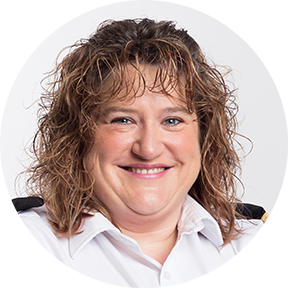
Sharon Bak
Emergency Management Field Officer
Emergency Management Ontario
As an Emergency Management Field Officer, Sharon Bak knows what it takes to make order out of chaos. PSPs in the emergency management sector are often forgotten until an emergency occurs. Then they rush into action facing stress and trauma both similar to, and different from, their counterparts in other sectors. The unique job of emergency managers is hard to understand for those outside the field, which is why having a peer support team is so important. Creating a peer support team for Emergency Management Ontario is just one of the reasons Chris Pittens nominated Sharon as a Champion of Mental Health.
As a person living with mental illness, Sharon has been vocal about mental health and wellness in her organization. This willingness to be vocal, combined with a lifelong drive to help people, has made Sharon the perfect advocate for improved mental health and wellness. In Sharon’s words, “Silence Kills. If I can use my voice and tell my story, it shows it is okay to be open.”
Sharon believes that the idea of stoic heroes is still very prevalent in the PSP community. Still, she is working hard to show that mental illness doesn’t define who you are, and it doesn’t set limitations on what you can do in your life. In fact, Sharon thinks she is better at her job because of her own struggles. They allow her to have empathy for those she is supporting through an emergency.
Sharon brings that same dedication to her workplace. As her nominator noted, Sharon established a Mental Health Working Group (MHWG) in her organization to help provide supports beyond those offered through their EFAP program. Sharon knows it is all a part of building mental health and wellness into her workplace culture, a move she thinks is essential for all organizations. For organizations to support mental health, Sharon believes there needs to be more money for support and education, and more buy-in from leadership to change the culture. When it comes to tools, Sharon knows it can’t be a one size fits all solution. This is why education on mental health and wellness, both personally and professionally, is so important.
Though Sharon doesn’t see herself as a hero, her nominator Chris does,
“A hero is someone who does not necessarily wear a cape but works tirelessly every day to share their stories, helps those who are struggling, takes risks, shows vulnerability by telling their truth, and stands up for others who have not yet found their voice. We can think of no better “hero” and Champion of Mental Health than Sharon Bak.”
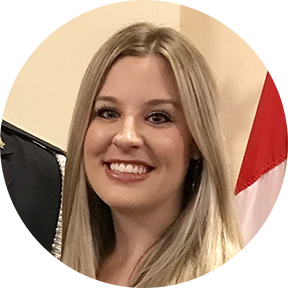
Courtney Brenner
Communications Operator
Niagara Regional Police Service
Communicator Courtney Brenner was inspired to help others because of her own experience as a 911 Dispatcher. In her role she faced several traumatic incidents that impacted her mental health. Through her own journey, Courtney saw the benefits associated with seeking help. She understands the importance of trauma survivors speaking out so others can begin to feel comfortable seeking help. She says it’s all about normalizing the experience.
After her own trauma experience, Courtney began actively helping others to reintegrate into the workplace. In her nomination of Courtney, Krista Neilson stated that Courtney was the first person who came to mind when she saw the nomination call for Champions of Mental Health. Krista sees Courtney’s dedication to others in the little things she does, such as dealing with tricky scheduling, working on her days off, and sacrificing preferred tasks so she can support another member of the organization during reintegration.
Courtney has seen significant improvements in her workplace’s approach to mental health during her years on the job. She has found that sharing her own story has been an effective tool in accessing support for others. Sharing how she sought help has also worked to reduce the stigma around seeking professional mental health services for others. She hopes that when she shares her story, people see someone who has experienced and overcome, trauma.
Courtney believes in the importance of reintegration for communicators, because it allows for a gradual return to work, and it can be customized to the individual. She has seen the benefits of reintegration and is proud to be a part of its success in her workplace.
Through her willingness to share her own story for the benefit of others, Courtney has shown she is a Champion of Mental Health.
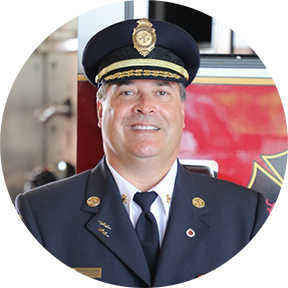
Chief Derrick Clark
Fire Chief
Oshawa Fire
As a firefighter, Chief Derrick Clark has experienced trauma firsthand. Looking back, he can see how these experiences have helped him to understand the scope of mental health issues faced by PSP. They have also inspired Chief Clark to focus on ensuring the people in his organization have long, healthy careers. He believes that as Chief, he has a responsibility to use his position to put in place programs and tools which support the mental health of his staff.
tools which support the mental health of his staff.
Chief Clark knows that stigma is still an issue for many PSP, so he has worked within his own
organization to create a safe space for people to talk about mental health.
According to his nominator Sandra Mackey,
“The Chief also recognizes there still is a stigma associated with members struggling with mental health issues that needs to be removed completely. No longer can the attitude of “its part of the job” or “to show emotion is to show weaknesses” be seen as acceptable. “
Chief Clark points out that it is often difficult to know who may be struggling with mental health challenges. Unlike an injured shoulder where the individual’s arm is in a sling, the signs can be hidden if that same individual is struggling with mental health issues. It’s why Chief Clark believes in peer support and its ability to offer a safe avenue for discussions about mental health. Chief Clark also knows that access to mental health resources needs improvement. He has partnered with local organizations such as Wounded Warriors, expanding access to mental services such as workshops, retreats, and counselling for his staff.
Chief Clark knows that for improvements to be made in the ability to access mental health supports, leaders need to understand the issues. He believes that leaders must play a central role in establishing programs and supports for their employees.
He also credits his staff, including his nominator Sandra for being the real champions in his organization, noting that their passion and dedication are crucial to his success in improving mental health services.
Chief Clark leads by example, and that has made him a Champion of Mental Health.
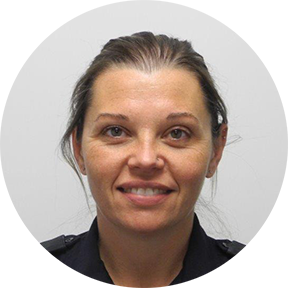
Constable Amanda Conway
Police Officer
Brandon Police Service
Amanda Conway thought her social work degree would help her relate to people on the street, but its value can be seen in the great work she has done within her organization. Two years after joining the Brandon Police Service, Amanda applied for an open position on the Employee Wellness team. Less than a year after joining the team, she became its Chair. Amanda credits her social work background for her decision to step forward in support of mental health in her organization.
Amanda’s education gave her an understanding and awareness of the impact police work can have on mental health. She has been working hard to bring that knowledge to her organization. Through her Project Resilience 911, she also brings it to other PSP organizations in the Brandon area.
Education is really a theme that is woven through all that Amanda has done in her organization. She believes that critical to eliminating the stigma around mental health, are the tools people need to recognize if their mental health has been affected by trauma. For Amanda creating good mental health in her organization is about “promotion, education, and normalization.” This means creating a safe environment in which employees can speak out, educating members on signs of mental health difficulties, and normalizing mental health issues in PSP. In addition, Amanda believes education about PSP mental health should be provided to a much broader group than just PSP. She believes counsellors, therapists, and psychologists should all be educated on the work of PSP, and the impact of that work on PSP mental health. Enhancing mental health professional understanding of this specialized group, Amanda feels, would remove a key barrier to PSP interest in accessing professional help.
Working with PSP families has also been important to Amanda, since they are often the first line of support for PSP. She has focused on providing families with opportunities to learn and participate in the same training offered to PSP.
In his nomination of Amanda, Randy Lewis highlighted a long list of initiatives that Amanda has accomplished in her four years as Chair of the wellness team, ending with the following:
“The Brandon Police Service, its employees, and emergency services personnel from western Manitoba are very fortunate to have Cst. Amanda Conway as part of our work family. Her expertise in the area of mental health, and her desire to improve the health and wellbeing of those around her, make Amanda a worthy recipient of this award.”
It’s clear Amanda is truly a Champion of Mental Health.

Nicholas Deschamps
Border Services Officer
Canadian Border Services Agency
According to the 18 individuals who nominated Nicholas Deschamps, he is a Champion for Mental Health. To them, Nicholas is the person who makes them smile when they need it, or is the one who provides a listening ear for their concerns. Nicholas is an active member of the employee assistance program, providing mental health training, sharing tools, and creating a specially designed room in which officers can relax. This room also allows for complete privacy for individuals who want to talk about their mental health.
Nicholas is a good listener, and he notices when he puts his listening skills to use, it seems to help his colleagues. For Nicholas, listening is critical. He feels that public safety personnel are often blocked from dealing with their emotions because they are afraid to show vulnerability. Nicholas still sees stigma as the number one issue for PSP. When asked about the supports he still feels are needed in PSP organizations, Nicholas is clear “more visibility, more promotion of mental health, and more availability of immediate supervisors.”
In the airport where he works, everyone is going 100 Km/h, and sometimes good mental health requires a chance to slow down and breathe. This is why Nicholas is proud of the “zen” room he set up. He knows it is a place where his co-workers can relax and take a break from the rhythm of their day.
Nicholas is also happy to use his voice at work. As a member of the EAP program and of the union, he tries to keep up with all the latest information and supports available to his co-workers. His co-workers appreciate it, many nominators highlighted how Nicholas’ sharing of his knowledge of resources and training has positively impacted their professional and personal lives.
Ultimately for Nicholas, however, it all comes back to listening to people who are having difficulties, and being available whenever he is needed, which is why he is a Champion for Mental Health.

Jeremy Fine
Agent de communication
Service de police de la ville de Toronto
Jeremy Fine a atteint un moment décisif après 12 ans de carrière, alors qu’il a perdu un coéquipier. Il a réalisé qu’il était allé à beaucoup de funérailles de collègues. Curieux de savoir pourquoi cela se produisait, Jeremy a effectué de la recherche et a été étonné par les effets des incidents sur la santé mentale. Les résultats indiquaient quelque chose qu’il n’avait jamais appris dans sa formation. C’est à la suite de cette recherche que Jeremy a décidé de s’exprimer au nom de ces collègues communicateurs, en partageant ce qu’il avait appris afin de leur faire comprendre les effets de leur travail sur leur santé.
Jeremy a aussi mis ses connaissances à profit comme pair aidant et formateur de RVPM. Lorsqu’il soutient ou forme quelqu’un, il essaie de l’aider à comprendre que les blessures mentales sont comme les blessures physiques : elles existent, elles sont légitimes, et elles méritent d’être traitées sans passer de jugement. Jeremy croit que plus les organisations renforcent ce message, à l’aide de formation et de politiques, plus il sera facile pour le PSP d’accéder à la liste grandissante de soutiens disponibles.
En proposant la candidature de Jeremy, Monica Di Tollo a souligné les efforts de Jeremy lors de la création d’un onglet «bien-être» sur le site Web de son employeur. Cet onglet est accessible à tous les communicateurs.
« Ce site est conçu dans le but de fournir aux membres l’information nécessaire afin de maintenir leur bien-être mental et physique. Il contient des informations sur le TSPT et comment en reconnaître les symptômes, ainsi que des liens vers de nombreux organismes dont le but est d’aider les gens à améliorer leur santé mentale. Jeremy a aussi monté une bibliothèque sur le bien-être en communications, qui offrent des livres adaptés spécialement pour aider les communicateurs à gérer le stress intrinsèque à l’exercice de leurs fonctions. »
Jeremy s’assure de faire remarquer la nature particulière du travail de communicateur. Dans n’importe quel quart, il est possible que le communicateur reçoive 10 à 15 appels qui pourraient être considérés comme incidents critiques. Les appels sont constamment en file avec la possibilité qu’un incident critique soit suivi d’un appel pour une chicane entre voisins à propos de déneigement. Jeremy affirme que c’est comme « mourir à petit feu » pour la santé mentale d’un communicateur. Mais même après tout ce stress, les communicateurs comme tout le PSP peuvent hésiter avant de demander de l’aide. Jeremy en constate deux raisons claires : la stigmatisation, la notion que parce que vous vous êtes engagé vous devez encaisser; et le besoin d’aider autrui, la principale raison pour laquelle s’engagent la plupart des membres du PSP.
Jeremy sait que l’outil le plus important pour lutter contre ces enjeux est de l’information factuelle, livrée si possible par un collègue du PSP. Afin de bien faire passer le message, il doit provenir du PSP, et voilà pourquoi Jeremy se sent privilégié de s’exprimer afin d’aider les autres membres du PSP, et en fait un champion de la santé mentale.
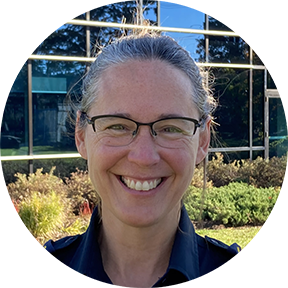
Lorraine Downey
Primary Care Paramedic and Peer Support Team Coordinator
Ottawa Paramedic Service
An experience early in her career, inspired Lorraine Downey to become a Champion of Mental Health. Lorraine regularly saw co-workers “disappear” – one day they would be at work, and then months would go by, and they would not return. Lorraine had no idea why they were gone, whether they had access to resources, or if there was anything that could be done to help them.
It was the concern about this silent disappearance which drove Lorraine to apply for, and be accepted to, her Paramedic services’ CISM team. This team has been expanded to a more proactive model than previously existed, and which features peer support for all staff, not only frontline paramedics.
Lorraine knows that every member of an organization is vital in supporting mental health. Even with extensive mental health supports, de-stigmatizing help-seeking is necessary to ensure people feel confident to try the programs offered by the organization. Lorraine knows that mental health support doesn’t end with the organization. As a daughter, wife, and sister of PSP, Lorraine understands that having PSP in her family impacts her, just as her work has impacted her family. Still, she also experienced the benefits of her family understanding her work, which is why she created friends and family nights for her organization. These nights facilitate increased understanding of PSP work and explain details that PSP may take for granted. The program really takes the mystery out of the PSP role for the families and friends who attend, and helps them prepare to offer support.
In his nomination of Lorraine, Chief Pierre Poirier noted that Lorraine is “an authentically kind and compassionate human being. She is empathetic, caring, and open-minded. She has a genuine interest and passion for helping others, and a gentle, calm disposition that is inherently inviting and supportive.” These thoughts were echoed in many quotes, from other members of her service, included in her nomination.
This passion for helping others can be seen in Lorraine’s proactive approach. Lorraine says,
“The most effective tools are the ones you have in place before you need them. These are the ones you actually reach for and have built into your life to provide support, comfort, and even laughter when you are in a tough place, or just after a tough week. Be open to trying new things, and not just once; I learned it can take many attempts. The tools you have may not work as well as they used to. Take time to evaluate what is and isn’t working. “
Lorraine’s work extends beyond her own organization. In recent years she has partnered and collaborated with other organizations in her city, to provide more services and training opportunities for her peer support team. Even with the increased need for support because of COVID, Lorraine and her team have continued to step up for mental health, adapting to continue providing much-needed support, making Lorraine a solid candidate for Champion of Mental Health.
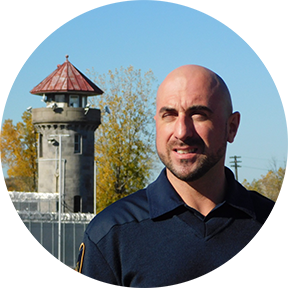
Marc Filatrault
Correctional Officer
Correctional Service Canada
For correctional officer, Marc Filatault being diagnosed with PTSD was hard to accept. He was angry that he would have to wear PTSD like a label, but as he moved through his treatment he realized that sharing his experience was essential to his peace of mind. In 2017 Marc participated in a documentary produced by the union of Canadian Correctional Officers. In the documentary, Marc was open about the incident that triggered his PTSD, and how he sought help. Breaking his silence and the stigma around talking about PTSD granted him inner peace, and it allowed him to turn the page on a dark period in his life.
Now Marc feels that everyone in the organization is responsible for ensuring the good mental health of a colleague. He believes that many public safety organizations have supports available, so it is essential to be able to recognize when a colleague is in distress, and to ensure they know about the accessible supports.
After his own experience, Marc believes that talking is the most effective tool available to support mental health. A willingness to be open, to share both emotions and negative thoughts, has been vital in Marc’s healing journey. When he works with others, he encourages the same openness. Marc has felt the impact of sharing his story. He has seen lives change as people have stepped forward to share their own mental health journeys.
For Marc sharing his story with colleagues and through the documentary has been a life-changing experience. He has had the opportunity to speak to government officials about mental health supports for correctional officers, and he has been able to help his peers find the support they need. Being active in support of mental health has given Marc pride, and it has encouraged him to keep fighting for this cause which is so close to his heart. Marc’s openness is what makes him a Champion of Mental Health.
If you are interested in hearing Marc’s story, you can view the video Working on the edge/ Travailler au bord du gouffre using this link (https://www.youtube.com/watch?v=LcWiF_fQwEw); please note there are scenes of violence and the subject matter may be triggering.
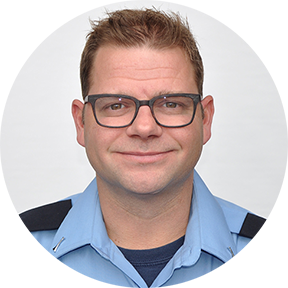
Captain Steve Fraser
Captain Mental Health and Wellness
Vancouver Fire and Rescue
Captain Steve Fraser never dreamed he would become a Champion of Mental Health. When he began his career as a firefighter Steve was just happy to have a job, but as he progressed in his career he found that his work impacted his mental health. Steve also saw fellow firefighters struggling. He decided there had to be a way to create supports that would ensure long healthy careers and retirements for firefighters.
Steve maintains that mental well-being is as important as physical well-being. While PPE can protect your body, training is required to protect your mind. According to Steve education is critical, which is why he has co-designed the program Resilient Minds. Steve felt there was a lack of interventions available, that were based on psychological best practices, and that addressed firefighters’ unique needs. He began working with researchers to evaluate Resilient Minds and ensure that the program was effective. He encouraged feedback so that he could further develop and tailor the program to the needs of firefighters. This program, which Steve thought would be used exclusively by his fire service in Vancouver, has expanded to firefighter organizations across Canada, including volunteer organizations that have had limited access to such training and support.
Through the development and implementation of training, Steve has started to see a change in the way organizations handle mental health, however, he points out three areas that continue to require needed improvements, these areas are:
1) mental health training should be prioritized, so that it is available throughout a firefighter’s career,
2) improved access is required to PSP-specific supports and mental health professionals that understand PSP culture, and
3) more robust benefit plans that support mental health services, need to be developed and available.
Steve also believes that trained peer supports within organizations can play an important role in reducing the stigma associated with asking for help, and can act as a conduit to professional services. He has also seen peers become mental health champions within organizations.
In her nomination of Steve, Leanne McLeod from CMHA said,
“Steve’s energy and commitment to his work has shifted the culture in the firefighter world. He broke down barriers to bring a psycho-education program to the largest fire department in BC, and then across Canada. He is an agent of change, and lives to ensure his peers, both in BC and across the country, are resilient, psychologically healthy, and supported. Steve is truly an inspiration.”
It might not have been his original goal, but Steve Fraser has become a Champion for Mental Health.
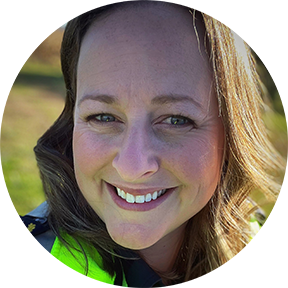
Amber Horsefield
Paramedic
Leeds and Grenville Paramedic Service
Amber Horsefield knows what it’s like to struggle with mental health issues. After attending a call that she says, “broke her”, Amber found it difficult to secure the help she needed. At that time her organization had limited supports available, and as a result she met with a mental health professional who didn’t understand her experiences as a paramedic. Amber, however, persevered, found the help she needed, and was able to return to work. Now she shares her story with her peers to help break the stigma around mental health, and to offer other paramedics in her service, permission not to be okay.
According to Amber, before she began her mental health journey she felt as if she was asked to put every bad call, or incident, into a bottle which was tightly stoppered. Now Amber understands that it is essential for her mental health that she open, and empty out, that bottle.
When asked what supports are needed in PSP organizations, Amber responded, “Grace, acceptance, and assistance,” she adds, “it is important for organizations to know their members as people and provide them time to take care of themselves.”
Today Amber meets regularly with her therapist to ensure she keeps emptying her bottle. She also finds relief in exercise. She says that when she is lifting weights she doesn’t think about anything else. Amber understands that to enable good mental health, it is critical that individuals become involved in activities that they enjoy, activities that allow them to step away from work.
In his nomination of Amber, fellow paramedic Tristian Layer said, “When it came to the idea of a mental health champion, I immediately thought of Amber. Not only has she shown that focusing on your mental strength and resiliency can make you a successful paramedic, she has also demonstrated that she supports her fellow coworkers, friends, family, and patients.“
Amber continues to work on improving her skills as a peer supporter, attending conferences and training, finding new methods and ideas she can use in her own workplace. She is always ready for that three am phone call from a co-worker who needs support, underscoring the fact that she is truly a Champion of Mental Health.

Corporal Dawn Langvine
Federal Policing Investigator
Royal Canadian Mounted Police
According to her nominator, Corp. Neil Vaid, Dawn Langevine works in one of the most challenging investigative units from a mental health standpoint, that being the National Child Exploitation Crime Centre (NCECC). Corp. Vaid goes on to say, “she has demonstrated outstanding leadership and a proactive approach to mental health.”
As a person of colour, Dawn brings a unique experience to her role as a peer supporter working to provide assistance and guidance to other BIOPOC officers. She co-founded the Depot Outreach team at the RCMP training academy to support new cadets. The program is designed to assist BIPOC cadets who wishes to speak with a member in the field who comes from a similar cultural, ethnic, linguistic background.
When asked about the importance of individuals stepping up for mental health, Dawn said,
“I believe it’s important for people within an organization to step up for mental health because
everyone needs to have and/or find their voice. The minute an individual steps up, they’re making
it easier for another to feel safe and open about their own experiences. Having a voice, even when
it shakes, shines light on a crowd of individuals suffering in the dark. It brings awareness to
barriers, challenges, and pain that can go unnoticed. When people step up, it brings hope to the
possibility of a solution and/or a support system to be formed. But most importantly, it causes
awareness.”
For Dawn, getting involved is also about educating the people around her on how mental health can vary. There is no one way with mental health. By providing education, even those who might not currently be struggling with mental health issues are empowered with the ability to be more self-aware.
Through her work as a peer supporter, Dawn has helped to combat the stigma around mental health. Dawn’s contributions are making a positive impact on those she works with and the RCMP as a whole. These impacts have been felt especially with BIPOC officers who are often deployed to areas where they may be the lone person of colour. Through her commitment to reducing stigma, and her work as a peer supporter, Dawn shows that she is a Champion of Mental Health.

Amanda MacCullam
Correctional Officer
Correctional Service of Canada
Amanda MacCullam is the coordinator for the Critical Incident Stress Management (CISM) team at the only federal maximum security facility for male offenders in Atlantic Canada. During the pandemic this facility has faced many challenges including an increase in incidents. In February of 2020 Amanda was the only trained CISM officer for the entire correctional officer group, and she responded to the bulk of incidents in the facility.
Amanda has stepped up in the past year and half to work with the institution’s leadership, the union, and the wellness action team, to increase awareness of CISM’s benefits among staff. Under her leadership the facility now has consistent follow up after each incident.
In her nomination of Amanda, Marla Kavalak said,
“Officer MacCallum takes a personal interest in ensuring that staff at the site feel supported when dealing not only with work related trauma but also personal trauma. Officer MacCallum makes herself available when a Correctional Manager reaches out to her following an incident, and she ensures that the CISM debrief and follow up occur in a timely manner. As a result of this follow up, last fiscal year the site had seen over 35 officers, who had been off on long term leave, return to the site.”
Amanda was inspired to champion mental health because,
“at CSC there are daily challenges that either immediately or over time take a toll on our mental health. Working so closely with so many people in all departments it was obvious to me that so many people were struggling. Seeing those struggles it became very important for me to try and offer some assistance and support.”
Amanda has also worked hard to change a culture that suggests you have to “suck it up and be tough”. She worked with co-workers to help them understand that talking about emotions does not make you weak, rather, reaching out for help is actually one of the strongest things someone can do. Amanda has shown that through leadership and perseverance you can make a difference in your work place. This passion and commitment make Amanda a Champion of Mental Health.

Tara Mayne
Regional Coordinator EAP &CISM programs
Correctional Service of Canada
Tara Mayne is bringing creativity to her role as regional coordinator for Correctional Services of Canada’s (CSC), Employee Assistance (EAP) and Critical Incident Stress Management (CISM) programs. Not only does Tara support the volunteers for these programs she is also trying to move beyond her job requirements to provide a variety of supports to the corrections workers in her region. Though she thinks it might be cliché, Tara believes that people are everything in an organization like CSC. She says the well-being of CSC employees allows the organization to provide the critical services necessary for the protection of all Canadians. Tara also recognizes that there are many different types of jobs at CSC, so she sees a huge need for varied supports that augment what can be provided by the two programs she oversees.
Tara has realized that large organizations must move beyond a one size fits all approach to offering mental health supports. She believes that leadership must check in with employees to ensure the supports available are flexible enough and can adapt to changing situations, such as those seen during the COVID-19 pandemic. Tara embraces finding new ways to procure support for people. She connects with community organizations to offer new opportunities for employees to attend workshops or programs. By pushing employees outside their comfort zone, she has seen people flourish. Tara also believes this kind of individual attention demonstrates the value the organization places on the work of its employees, which builds trust and enables people to be more open when they are struggling.
One of Tara’s nominators, Jamile Amery, said, “In being promoted to the role of Regional Coordinator of EAP/CISM programs, Tara brought to that role an outside-the-box way of invigorating the program, by focusing first on the psychological well-being and needs of 16 peer support teams.”
Tara’s out-of-the-box thinking was tested during the COVID-19 pandemic as regular programs could no longer be offered. She mobilized ideas such as wellness tents at locations where outbreaks had occurred. These tents brought peer supporters and union representatives together, providing workers an opportunity for a needed moment away from the stress. She has also partnered with St. John’s Ambulance to bring therapy dogs to her sites. Tara understands that just a simple thing like 15 minutes with a dog can have a positive impact on mental health.
Tara’s out-of-the- box thinking continues, with her nominator pointing out that she is now working to bring music therapy to her sites. This dedication to creative approaches in support of mental well-being is why Tara is a Champion of Mental Health.
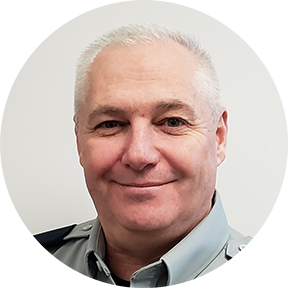
Sergeant Shelby Miller
Employee Management Relations
Royal Canadian Mounted Police
Shelby Miller understands that struggling with mental health issues can be isolating, especially in the Far North, where mental health services are harder to access. In 2018 the RCMP realized it had a weak footprint in terms of mental health support offered in the territory. Officers and civilian members were suffering from a lack of support. Shelby was tasked with reviving the peer-to-peer program in Nunavut. Working with a psychologist, Shelby sought to develop and implement a strong program that could support all members working in the expansive territory.
Shelby had experienced his own mental health struggles in the past, and he understood what other members might be facing. He had found that having a conversation with someone at the right time – Being able to “Talk it Out”, to be among the most effective tools in supporting mental health.
It was because of these experiences that Shelby has focused on building trust and reducing stigma. He wanted members to feel free to vent about their experiences, knowing that someone was there to listen. For Shelby communication is vital. The peer-to-peer program in Nunavut has grown to ten volunteers who have all been trained to listen to member concerns, and to provide guidance and support. Shelby also helped implement a policy which requires members working in the high arctic to receive a mandatory psychological evaluation if they wish to extend their tenure in the north. This process ensures that the safety of members and the public is preserved.
Shelby also recommends exercise as part of maintaining good mental health. He believes the ability to engage the body to clear the mind is essential. For Shelby, a key to good mental health is being ready to clean out your mental filing cabinet, which means trusting the people who are there to support you.
In his nomination of Sgt. Miller, Denis Savard said Shelby has been instrumental in ensuring the well-being of RCMP members in Nunavut’s 25 detachments. CIPSRT agrees and is proud to have Sgt. Shelby Miller as a Champion of Mental Health.
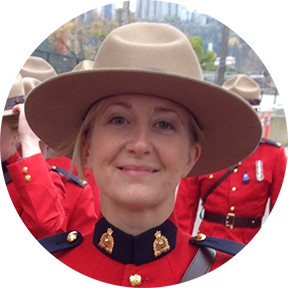
Constable Kandice Perry
Police Officer
Royal Canadian Mounted Police
It took Kandice Perry a while to find her voice. As a child in Newfoundland, she had watched a father she loved push down his emotions, turning to alcohol to drown his issues. As a bright young RCMP officer, Kandice could see her father in the people she dealt with daily. She could see how conflicts were born when people were unable to cope with life’s downtimes.
This awareness inspired Kandice to begin taking psychology classes to help her better understand the people she dealt with daily. At the same time, Kandice juggled the regular policing-caused traumas, while also dealing with the challenge of being a woman in a male-dominated profession. Until 2014, Kandice pushed down her feelings and worked to be stronger and better than her male counterparts. Then, while attending a presentation on PTSD, she realized the symptoms discussed were like a checklist of her own experiences. She reached out to a psychologist and accessed help. As Kandice worked on her own mental health, she pursued her dream of being a Police Dog Handler, and she became an R2MR facilitator. In 2017 she had a setback, when an injury left her feeling crushed. Depression, anxiety, and pain overwhelmed her ability to cope, and she found herself contemplating suicide. On one of her lowest days, her small daughters made her realize she needed to pick herself up and get help. This time the help came in a furry package. Kandice reached out to the Courageous Companions program and found support. Charlie, a dog, came into her life, and Kandice found her voice working to justify the importance of service animals in support of mental health.
When asked why it’s vital to step up to support mental health within an organization, Kandice responds:
“First responders are society’s filters. We see people at their worst. We see death and gore. In the past six years, Fort McMurray has been through the wildfires, the economic recession, floods, and a state of emergency during the pandemic. Throughout all of these catastrophic events, first responders have answered the call. So many of us are walking around damaged, and if we do not feel safe enough within our own organization to come forward and seek help, then the organization is failing. Losing one police officer to suicide is too many. The culture needs to shift from what can I get out of my employees, to how can we better serve our employees?”
To Kandice, support programs must be created and implemented by frontline members, so that a sense of trust can be built. In her RCMP career she has seen her organization move forward by leaps and bounds in improving mental health supports. She would, however, still like to see additional resources for young women entering the profession, so that they can be supported while having a career and a family. Kandice knows that no one should suffer alone, which means a solid support system is crucial. She credits her husband, a fellow first responder, for his unwavering support, and the unconditional love and understanding he has provided her. During her lowest points, Kandice felt like no one cared. When she was off with injury, she became afraid of returning to work, so she developed the “Buffalo Debrief,” a newsletter that helps shine a light on mental health and works to build community in her workplace. She designed the newsletter, “To build a bond through information and events. Even if you are not talking to anyone or haven’t been in the office, the information is out there for you to engage in whenever you are ready.”
Kandice’s nominator points out how she and Charlie continue to educate on the value of service dogs, demonstrating another treatment method available to first responders. Kandice’s compassion and her journey to help others have made her a Champion of Mental Health.
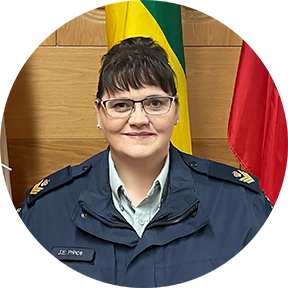
Sergeant Joy Prince
Peer to Peer Coordinator “F” division
Royal Canadian Mounted Police
Joy Prince doesn’t think she deserves this award. Joy doesn’t think of herself as a Champion of Mental Health, even though she accepted a position as the first peer-to-peer coordinator in her division. She sees her contributions to her fellow RCMP members as only doing her job.
Her nominator Rhonda Blackmore disagrees, saying,
“Joy started in the inaugural “F” Division Peer to Peer Coordinator’s role in 2015 with an affinity for helping others. Through her stalwart character, Joy has evolved the program into a nationally recognized best practice, based on her empathetic listening and being a compassionate human being. She promotes the sense you are not alone, encouraging the idea that there is no shame in reaching out, and we are in this together. Sgt Joy Prince embodies the spirit of the Mental Health Champion award.”
Joy sees the goal of her job as improving the days of others, making it a little easier to reach out for help after dealing with a bad call. Joy admits that when she started working with the RCMP, mental health was not commonly discussed, but she has seen a shift during her time as a peer-to-peer coordinator. When she began, she would reach out to people after being briefed about a bad call; now, members call her to tell her they had a bad call. When they do call, Joy tries to pull out all the stops to get them the help that best suits their needs. She credits the people she works with, and her fellow peer-to-peer coordinators from across Canada, for providing a collaborative atmosphere which enables her to bounce ideas around in support of members. She sees this broad ability to collaborate as a benefit of working with a large organization. Another advantage she’s found is the structures that allow leadership to see trends in members support needs. Joy appreciates the variety of tools like Lifespeak and SOSI she can offer to those who reach out for help, though she would still like to see more psychologists trained to understand PSP issues.
She knows there is still work needed in making mental health mainstream, but she has a vision that she hopes can eventually be achieved – she hopes for,
“Organizations in which speaking about your mental health is as easy as speaking about your physical health, and a stigma-free work environment.”
By working towards this vision, Joy is championing mental health in her organization, but don’t call her a Champion.
“I just feel privileged to be the person people called when they need support. It is an honour to have their trust, and to support them during their hard times.”
Joy may not want to be called a Champion of Mental Health, but CIPSRT is privileged to give her the title.
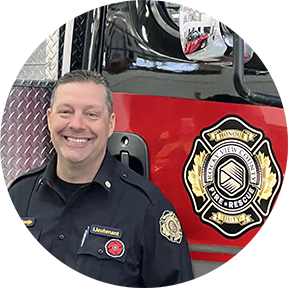
Lieutenant Gregg “Scully” Schaalje
Firefighter
Rocky View County Fire and Rescue
Gregg Schaalje, Scully, to everyone who knows him, has spent much of his firefighting career advocating for mental health. When asked what inspired him to do this work, Scully points back to an incident early in his career as a volunteer firefighter. His team responded to a fatal car accident, and as a rookie, he was tasked with holding the light for the attending medics. This gave a young Scully a clear vision of the scene and the devastation of the wreck, whose passengers were trapped when the car caught on fire.
The call could have resulted in a permanent trauma, preventing Scully from pursuing a career in firefighting, but his Chief called in a psychologist a couple of days later, and offered the team a debrief. With Critical Incident Stress Management (CISM) still a new program, Scully’s experience with the CISM team enabled him to process the trauma of that scene. It provided a closure that he credits with saving his fledgling firefighting career. Six years later, he volunteered to be a part of a new CISM team in Medicine Hat.
Those actions taken by Scully’s first Fire Chief showed Scully how important it is to step up for mental health. He has since seen the impacts of stigma on PSP, and he believes it is still a big issue in the PSP community. He has, however, also seen improvements, such as training opportunities and the offering of programs to support resilience. Scully knows there is still a long way to go when it comes to protecting mental health, and he stresses that organizations need to have procedures and policies in place which enable individuals to take care of their mental health, without having to face stigma when they return to work. He says modification of duties or reduced opportunities for advancement can’t be allowed to happen.
When it comes to taking care of his own mental health, Scully looks inward to find activities that help to support his own resilience. These days Scully’s resilience support comes from paddle boarding and flying. He believes that activities which have an impact on resilience are the ones that force the individual to focus on the moment, which means the activity is specific to the individual.
Scully also believes in the value of peer led programs, psychologist support, and a sound evidence base. He has experienced the benefits of trained peer supporters, but also understands that there is a time for mental health professionals to step in.
In his nomination of Scully, Malcolm McNeil said,
“Gregg’s efforts, passion, advocacy, presentations, and direct facilitation of peer support services are tremendously influential in reducing mental health stigma, and in directly improving and saving the lives of his fellow first responders.”
Scully doesn’t think of himself as a Champion of Mental Health, but credits the people who have trained and influenced him, for his ability to do this important work.

Sergeant Akhasone Samonekeo
Federal Policing
Royal Canadian Mounted Police
Akhasone Samonekeo became a police officer to help people, never realizing that sometimes it is police officers that need help. When Akhasone joined the RCMP, he was older than the other trainees in his troop. He found this led other members to come to him for advice. Over time he noticed a lot of the advice they were seeking was similar, so he decided to step up and become educated about the supports available for fellow members. His hope was that by becoming informed, he would be able to help without causing any unintentional harm.
These first steps led Akhasone to become part of the peer-to-peer program, established at the RCMP in 2016. When asked why it is important for people within organizations to step up for mental health Sgt. Samonekeo answers simply, “Stigma.” In his opinion, the more people that stand up for mental health, the better, even if they have not experienced mental health struggles. Ahkasone has begun to see a shift in his workplace. There are more supports than before, but he still sees that there is a hesitancy to use the available resources.
In her nomination of Akhasone, Karla Kincade said that Akhasone “has spent years working tirelessly on raising awareness, removing stigma, and delivering support services for mental health issues.”
This tireless pursuit of improvement can be heard in Akhasone’s voice as he talks about the education and myth-busting needed to create a safe environment in which people can share their mental health concerns. For Akhasone, it is not just sworn members who need support; he sees non-sworn members who are impacted by their work. The solution, according to Akhasone is the same for each person – find out what they need, and what supports are going to help them create harmony between their work and personal lives.
Karla has seen the impact of Akhasone’s commitment:
“Sgt. Samonekeo was the first person I heard in my organization speak of mental health issues publicly in work settings and, by doing so, changed the culture on my team by removing the stigma associated with these discussions.”
For Akhasone, these hard conversations are more than just checking a box. They are a way to break down barriers, which is why he is a Champion of Mental Health.
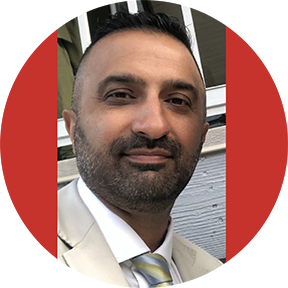
Shawn Saran
Acting Manager Commercial and Trade Branch
Canadian Border Services Agency
Shawn Saran, an acting Manager with the Canadian Border Services Agency (CBSA), is passionate about his workplace’s employee assistance program (EAP). After experiencing mental health issues in his own family, including trying to find support for his son, who was diagnosed with autism, Shawn was ready to step up when a spot opened up on his regional mental health advisory group. Shawn began his career in the public service, working in corrections before moving to CBSA. In both organizations, he saw EAP as just a card or pamphlet in the breakroom, so when he moved into a management role, Shawn decided to pick up the phone and see what EAP had to offer. What he found was a service with many underutilized supports.
Shawn found that the stigma associated with the need for mental health supports, impacted the number of people reaching out to use EAP services. According to his nominators, Shawn has worked tirelessly to battle the stigma around mental health, by being open with his own struggles. Shawn received no support through his son’s autism diagnosis, and he didn’t want that for others, so he began to promote the benefits of the EAP program. He also helped create a monthly mental health newsletter, designed to support management in having mental health conversations with their staff. Through these conversations, stigma about coming forward with mental health issues can be reduced.
In April of 2021, Shawn experienced a significant health scare. A sudden severe heart attack left Shawn and his family in need of support, not only physically, but also mentally and emotionally. Shawn reached out to EAP for that support. When he returned to work, he shared his story and ensured that EAP was there if anyone else wanted to reach out for support. One of Shawn’s nominators said this experience shows why Shawn is a Champion.
“Shawn says if he can have the conversations with others, it shows that we are all vulnerable, and that we should not take our health for granted. He shared what this experience meant for his own mental health and how it impacted his loved ones. Shawn demonstrates humanity in his daily interactions with people. Shawn’s personal experiences make him a very compassionate and giving individual. He genuinely cares about people.”
Shawn is not done making an impact. He wants to see more supports for those workers who fall into the middle of the organization, those who not only need to protect their own mental health, but also need help to care for the mental health of those they supervise. This commitment shows why Shawn is a Champion of Mental Health.
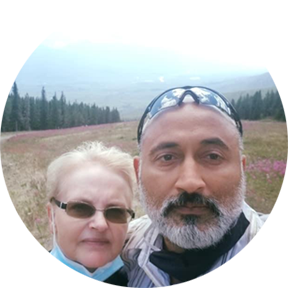
Sergeant Jagdeep Soin
Peer to Peer Coordinator National Headquarters
Royal Canadian Mounted Police
It wouldn’t be an exaggeration to say a peer supporter saved Jagdeep Soin’s life. At his lowest point, Jagdeep reached out to a peer supporter through Badge of Life Canada. It was a coffee with a retired Ottawa police officer that set him on his journey to recovery. This moment inspired Jagdeep to become a peer supporter within his organization, the RCMP, and a volunteer with other organizations in the Ottawa area. It also led him to champion the creation of the peer-to-peer program at the RCMP national headquarters. It was simple, the RCMP needed to understand the costs of operational stress injuries (OSI), so he made a case showing that productivity could be increased if more support was offered.
Since he began to work as a peer supporter, Jagdeep has seen changes in the RCMP. More supports are available, and more people are willing to talk about their experiences, but Jagdeep knows that stigma remains. To combat this stigma, he suggests education at every level of the organization about mental health. Specifically, what is an OSI, and how do you access help when you need it? Jagdeep believes this education is essential at every level, from cadets through to the Commissioner.
This education also means that you can be proactive about mental health. Jagdeep’s nominator Phillipe Cyr described it this way:
“What separates Jag from other Peer advisors is his preventative maintenance program. Once you meet Jag, and you talk to him, you enter into a healthy relationship that never expires. I really don’t know how he does it, but he calls people on a regular basis, including myself, wondering how they’re doing. He reminds people to take time off, to do something for themselves and to maintain a healthy lifestyle. Although Jag currently works for the RCMP NHQ’s Peer to Peer unit, everyone recognizes Jag as the face of the program.”
When asked to recommend tools beyond peer support, Jagdeep points out the benefits of networking with other organizations and community groups. Networking helps build knowledge and creates a map of services for people that need support. Through his network in Ottawa, Jagdeep has been able to provide access to more education, training, and services for the people he supports.
Jagdeep admits coming forward with his story has changed the direction of his career but being a Champion of Mental Health has given him a new purpose.
“I’ve seen too much suffering and watched colleagues die, who could have been saved if they had had someone to talk to, someone who told them, I been through a similar journey. Doing this work, you see the difference you make and the lives you save.”